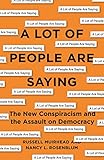A lot of people are saying : the new conspiracism and the assault on democracy / Russell Muirhead, Nancy L. Rosenblum.
Material type: TextLanguage: English Publisher: Princeton, New Jersey : Princeton University Press, 2019Description: ix, 211 pages ; 23 cmContent type:
TextLanguage: English Publisher: Princeton, New Jersey : Princeton University Press, 2019Description: ix, 211 pages ; 23 cmContent type: - text
- unmediated
- volume
- 0691188831 (hardcover)
- 9780691188836 (hardcover)
- New conspiracism and the assault on democracy
- Conspiracy theories -- Political aspects -- United States
- Truthfulness and falsehood -- Political aspects -- United States
- Democracy -- United States
- Teorías de la conspiración -- Estados Unidos
- Conspiraciones -- Teorías
- Democracia -- Estados Unidos
- Conspiracy theories
- Democracy
- Politics and government
- Politische Kommunikation
- Verschwörung
- Suggestion
- Behauptung
- Gemeinplatz
- Verschwörungstheorie
- Glaubwürdigkeit
- Demokratie
- United States -- Politics and government -- 21st century
- Estados Unidos -- Política y gobierno -- Siglo XXI
- United States
- USA
- 320.973
- JK 275 M953l 2019
| Item type | Current library | Home library | Collection | Shelving location | Call number | Copy number | Status | Barcode | |
|---|---|---|---|---|---|---|---|---|---|
 Libro
Libro
|
Biblioteca Juan Bosch | Biblioteca Juan Bosch | Ciencias Sociales | Ciencias Sociales (3er. Piso) | JK 275 M953l 2019 (Browse shelf(Opens below)) | 1 | Available | 00000162989 |
Includes bibliographical references (pages 177-200) and index.
Section I. The new conspiracism. Conspiracy without the theory -- It's true enough -- Presidential conspiracism -- Section II. Delegitimating democracy. Political parties -- Knowledge -- Who owns reality? -- Section III. Defending democracy. Speaking truth. -- Conclusion: The crisis of democracy.
Conspiracy theories are as old as politics. But conspiracists today have introduced something new - conspiracy without theory. And the new conspiracism has moved from the fringes to the heart of government with the election of Donald Trump. Russell Muirhead and Nancy Rosenblum show how the new conspiracism differs from classic conspiracy theory, why so few officials speak truth to conspiracy, and what needs to be done to resist it. Classic conspiracy theory insists that things are not what they seem and gathers evidence - especially facts ominously withheld by official sources - to tease out secret machinations. The new conspiracism is different. There is no demand for evidence, no dots revealed to form a pattern, no close examination of shadowy plotters. Dispensing with the burden of explanation, the new conspiracism imposes its own reality through repetition (exemplified by the Trump catchphrase "a lot of people are saying") and bare assertion ("rigged!"). The new conspiracism targets democratic foundations - political parties and knowledge-producing institutions. It makes it more difficult to argue, persuade, negotiate, compromise, and even to disagree. Ultimately, it delegitimates democracy. Filled with vivid examples, A Lot of People Are Saying diagnoses a defining and disorienting feature of today's politics and offers a guide to responding to the threat.
There are no comments on this title.

